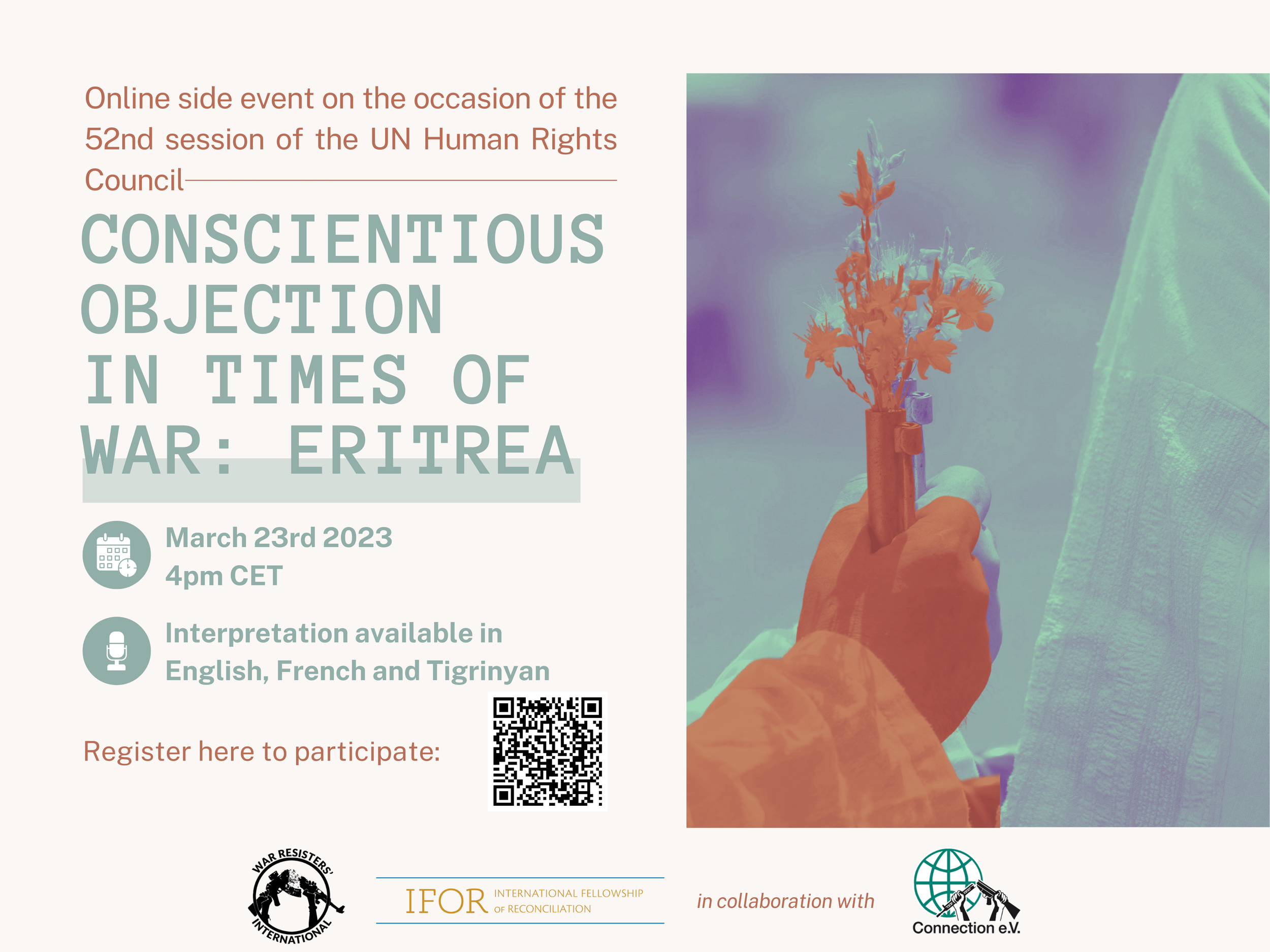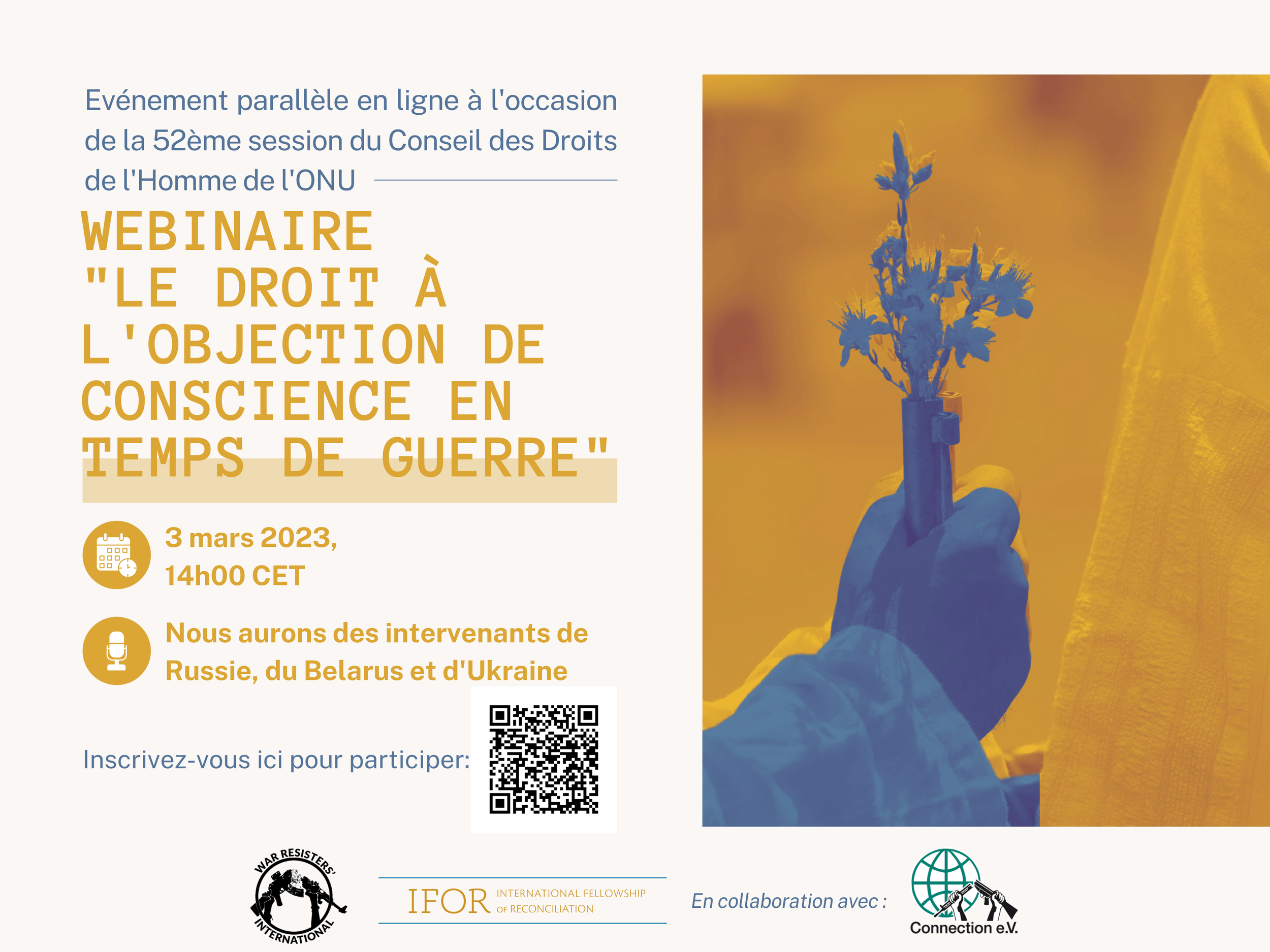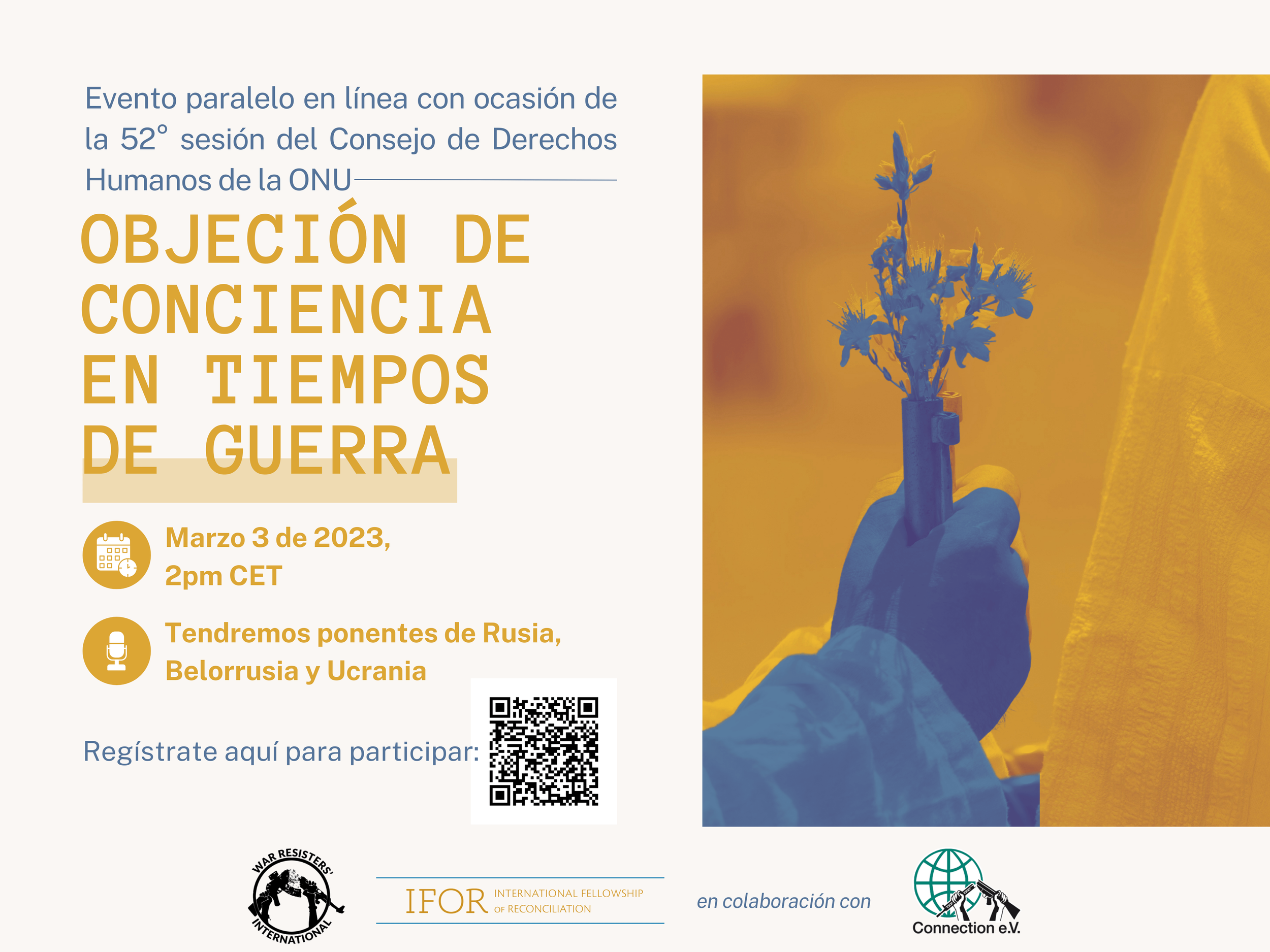Association Mauritanienne pour la Promotion du Droit December 12th Movement International Secretariat International Association Against Torture (IAAT-AICT) International Educational Development, Inc. Paz y Cooperación World Barua Organisation
General Assembly
Human Rights Council
52nd session
Item 2 – Annual report of the United Nations High Commissioner for Human Rights General debate
I thank you Mr. President,
I have the honour to speak on behalf of a group of over 300 organisations (https://www.genevaforwesternsahara.org/members-miembros-membres) called Geneva Support Group for the Protection and Promotion of Human Rights in Western Sahara.
Mr. High Commissioner,
We noted with appreciation your Office concerns about the human rights situation in the occupied Non-Self-Governing Territory of Western Sahara and its remote monitoring. But this is clearly not enough.
Indeed, after your Office mission of 2006, the Saharawis had to wait until 2015 for a new mission to visit the occupied Western Sahara. The occupying Power cannot continue barring access to the Territory in order to ensure impunity for the crimes committed against Saharawis.
The systematic and serious violations of international humanitarian law and human rights committed by the Kingdom of Morocco in the Non-Self-Governing Territory of Western Sahara need the development and implementation of independent and credible measures to ensure full respect for human rights, a requested by the Security Council.
As scandals break out in Europe in political and media circles in relation to suspicious acts of corruption on the part of the Kingdom of Morocco, it would be wise for the occupying Power to take seriously the request of the Security Council and to fully cooperate with the Office of the High Commissioner.
I thank you for your attention.
8 March 2023
******
Assemblée générale
Conseil des droits de l'homme
51ème session
Point 2 - Rapport annuel du Haut-Commissaire des Nations Unies aux droits de l'homme Débat général
Je vous remercie Monsieur le Président,
J’ai l'honneur de parler au nom d'un groupe de plus de 300 organisations (https://www.genevaforwesternsahara.org/members-miembros-membres) appelé Groupe de Soutien de Genève pour la Protection et la Promotion des Droits de l’Homme au Sahara occidental.
Monsieur le Haut-Commissaire,
Nous avons pris note avec satisfaction des préoccupations de votre Bureau concernant la situation des droits de l'homme dans le Territoire Non Autonome du Sahara occidental sous occupation et de votre surveillance à distance. Mais cela n'est clairement pas suffisant.
En effet, après la mission de votre Bureau en 2006, les Sahraouis ont dû attendre jusqu'en 2015 pour qu'une nouvelle mission se rende au Sahara Occidental occupé. La Puissance occupante ne peut pas continuer à interdire l'accès au Territoire afin d'assurer l'impunité des crimes commis contre les Sahraouis.
Les violations graves et systématiques du Droit International Humanitaire et des droits de l'homme commises par le Royaume du Maroc dans le Territoire Non Autonome du Sahara occidental nécessitent l'élaboration et la mise en œuvre de mesures indépendantes et crédibles pour assurer le plein respect des droits de l'homme, comme l'a demandé le Conseil de sécurité.
Alors que des scandales éclatent en Europe dans les milieux politiques et médiatiques en relation avec des actes suspects de corruption de la part du Royaume du Maroc, il serait sage pour la Puissance occupante de prendre au sérieux la demande du Conseil de sécurité et de coopérer pleinement avec le Bureau du Haut Commissaire.
Je vous remercie de votre attention.
8 mars 2023
******
Asamblea General
Consejo de Derechos Humanos
51º período de sesiones
Tema 2 - Informe anual del Alto Comisionado de las Naciones Unidas para los Derechos Humanos
Debate general
Gracias Señor Presidente,
Tengo el honor de hablar en nombre de un grupo de más de 300 organizaciones (https://www.genevaforwesternsahara.org/members-miembros-membres) llamado Grupo de Apooyo de Ginebra para la Protección y la Promoción de los Derechos Humanos en el Sáhara occidental
Señor Alto Comisionado,
Tomamos nota con aprecio de la preocupación de su Oficina por la situación de los derechos humanos en el Territorio No Autónomo Ocupado del Sáhara Occidental y su vigilancia a distancia. Pero está claro que esto no es suficiente.
De hecho, tras la misión de su Oficina de 2006, los saharauis tuvieron que esperar hasta 2015 para que una nueva misión visitara el Sáhara Occidental ocupado. La Potencia ocupante no puede seguir impidiendo el acceso al Territorio para garantizar la impunidad de los crímenes cometidos contra los saharauis.
Las sistemáticas y graves violaciones del derecho internacional humanitario y de los derechos humanos cometidas por el Reino de Marruecos en el Territorio No Autónomo del Sáhara Occidental requieren el desarrollo y la aplicación de medidas independientes y creíbles que garanticen el pleno respeto de los derechos humanos, tal y como ha solicitado el Consejo de Seguridad.
A medida que estallan en Europa escándalos en círculos políticos y mediáticos en relación con sospechosos actos de corrupción por parte del Reino de Marruecos, sería prudente que la Potencia ocupante se tomara en serio la petición del Consejo de Seguridad y cooperara plenamente con la Oficina del Alto Comisionado
Agradecemos su atención.
8 de marzo de 2023
******
The following NGOs, without ECOSOC status, also share the view expressed in the statement:
Les ONG suivantes, sans statut ECOSOC, partagent également l’opinion exprimée dans la déclaration :
Las siguientes ONG sin estatus ECOSOC también comparten la opinión expresada en la declaración:
ACAT Nyonsais-Baronnies, Acció Solidària amb el Sàhara, Acción Solidaria Aragonesa (ASA), Africa Solidarity for Sahrawi, African Hungarian Unión, African Law Foundation (AFRILAW), Afrika Netzwerk Bremen e.V., Agrupación Chilena de Ex Presos poíticos, Alliance de l’Europe centrale et orientale de solidarité avec le peuple Sahraoui, American Peace Information Center, Amigos por un Sahara Libre, ARCI Città Visibili, A.R.S.P.S. - Rio de Oro, Artisans du Monde Vaison la Romaine / Pain et Liberté, Asocición ALOUDA de Amigos del pueblo saharaui de Altoaragón, Asociación Amal Centro Andalucía, Asociación Amal Nanclares, Asociación Amigos del Pueblo Saharaui del Campo de Gibraltar (FANDAS), Asociación Amigos del Pueblo Saharaui de Toledo, Asociación de Amigos y Amigas de la R.A.S.D. de Álava, Asociación de Amistad con el Pueblo Saharaui de Albacete, Asociación de Amistad con el Pueblo Saharaui de Sevilla, Asociación de Apoyo al Pueblo Saharaui de Jaén, Asociación ARDI HURRA, Asociación Asturiana de Solidaridad con el Pueblo Saharaui, Asociación Awlad El Mezna Murcia, Asociación Baha Malaga, Asociación Banat Saguia y Wad Dahab, Asociación Canaria de Amistad con el Pueblo Saharaui (ACAPS), Asociación Canaria de Solidaridad con el Pueblo Saharaui, Asociación Chilena de Amistad con la República Arabe Saharaui Democrática, Asociación Colombiana de Amistad con el Pueblo Saharaui, Asociación de la Comunidad Saharaui en Argon (ACSA), Asociación Concordia Tenerife, Asociación Convsol Amurrio, Asociación Cultural Peruano Saharaui, Asociación de Discapacitados Saharauis, Asociación Doctora Beituha, Asociación Ecuatoriana de Amistad con el Pueblo Saharaui (AEAPS), Asociación Enour, Asociación de Familiares de Presos y Desaparecidos Saharauis (AFAPREDESA), Asociación por la Justicia y los Derechos Humanos, Asociación de Médicos Saharaui en España, Asociación Mexicana de Amistad con la República Árabe Saharaui A.C. (AMARAS), Asociación Navarra de Amigos y Amigas de la R.A.S.D. (ANARASD), Asociación Navarra de Amigos y Amigas del Sahara (ANAS), Asociación Panameña Solidaria con la Causa saharaui (APASOCASA), Asociación Pro Derechos Humanos de España (APDHE), Asociación Profesional de Abogados Saharauis en España (APRASE), Asociación por la Protección de los Presos Saharaui en las Cárceles Marroquí, Asociación Rimal Sáhara-Tormes, Asociación Riojana de Amigos de la R.A.S.D., Asociación Sahara Euskadi Vitoria, Asociación Sahara Gasteiz Vitoria, Asociación Sahara Ihsan, Asociación Saharaui contra la Tortura, Asociación Saharaui para la Protección de los Derechos Humanos y los Recursos naturales, Asociación Saharaui para la Protección y Difusión del Patrimonio cultural Saharaui, Asociación de Saharauis en Alicante, Asociación de Saharauis en Ávila, Asociación de Saharauis en Bal, Asociación de Saharauis en Fuerteventura, Asociación de Saharauis en Grenada, Asociación de Saharauis en Jerez de la Frontera, Asociación de Saharauis en Lebrija, Asociación de Saharauis en Tenerife, Asociación de Saharauis en Valdepeñas, Asociación Sidemu Mojtar Estepona, Asociación Tawasol Lludio, Asociación Um Draiga de Zaragoza, Asociación Venezolana de Solidaridad con el Sáhara (ASOVESSA), Asociación de Víctimas de Minas (ASAVIM), Asociación de Zamur Valencia, Associação Amigos e Solidaridade ao Povo Saharaui (ASAHARA), Associação de Amizade Portugal - Sahara Ocidental (AAPSO), Associació d’Amics del Poble Sahrauí de les Iles Balears, Association des Amis de la RASD (France), Association de la Communauté Sahraouie en France, Association Culture Sahara, Association culturelle Sahraouie en France, Association des Femmes Sahraouies en France, Association Française d'Amitié et de Solidarité avec les Peuples d'Afrique (AFASPA), Association of Humanitarian Lawyers, Association for the Monitoring of Resources and for the Protection of the Environment in Western Sahara (AMRPENWS), Association pour un Référendum libre et régulier au Sahara occidental (ARSO), Association Sahara Matinba Bruxelles, Association Sahraouie des Victimes des Violations Graves des Droits de l’Homme Commises par l’Etat Marocain (ASVDH), Association des Sahraouis en Belgique, Association des Sahraouis de Bordeaux, Association des Sahraouis du Centre de la France, Association des Sahraouis de Les Mureaux, Association des Sahraouis de Mantes-la-Jolie, Association des Sahraouis de Montauban, Association des Sahraouis de Perigueux, Association pour la Sauvegarde de l'Environnement au Sahara occidental (ASESO), Association de Solidarité avec le Peuple Sahraoui (ASPS), Association de la Vie Maghrébine pour la Solidarité et le Développement (AVMSD), Associazione bambini senza confini, Associazione culturale "Cinema e diritti", Associazione Jaima Sahrawi per una soluzione giusta e non violenta nel Sahara Occ., Associazione Nazionale di Solidarietà con il Popolo Saharaui, Australia Western Sahara Association (AWSA), attac Hungarian, Bentili Media Center, Bremer Informationszentrum für Menschenrechte und Entwicklung (biz), Bureau International pour le Respect des Droits Humains au Sahara occidental (BIRDHSO), Campaña Saharaui para la sensibilisación sobre el peligro de Minas (SCBL), Cantabria por el Sáhara, Central Unitaria de Trabajadores de Chile, Centro Brasileiro de Solidaridad con los Pueblos y Lucha por la Paz, CEBRAPAZ, Centro de Documentación en Derechos Humanos “Segundo Montes Mozo S.J.” (CSMM), Centro Saharaui por la Salvaguardia de la Memoria, Colectivo Saharaui en Estepona, Colectivo Saharaui en Gipuzkoa, Colectivo Saharaui en Jaén, Colectivo Saharaui en Lanzarote, Collectif des Défenseurs Saharaouis des droits de l'homme (CODESA), Comisión Ecuménica de Derechos Humanos de Ecuador (CEDHU), Comisión General Justicia y Paz, Comisión Media Independientes, Comisión Nacional de los Derechos Humanos de la República Dominicana (CNDH-RD), Comisión Nacional Saharaui por los Derechos Humanos (CONASADH), Comitato “Selma2.0”-odv, Comité d’Action et de Réflexion pour l’Avenir du Sahara Occidental, Comité de Amistad con el pueblo Saharaui – Argentina, Comité de Apoyo por el Plano de Paz y la Protección de los Recursos Naturales en el Sáhara Occidental, Comité Belge de soutien au Peuple Sahraoui, Comité de Defensa del Derecho de Autodeterminación (CODAPSO), Comité de Familiares de los 15 Jóvenes Secuestrados, Comité de Familiares de Mártires y Desaparecidos, Comité de Familiares de los Presos Políticos Saharauis, Comité de Jumelage et d'Echange Internationaux / Gonfreville l'Orcher, Comité de Protección de los Defensores Saharauis – Freedom Sun, Comité de Protección de los Recursos Naturales, Comité Saharaui de Defensa de Derechos Humanos (Glaimim), Comité Saharaui de Defensa de Derechos Humanos (Smara), Comité Saharaui de Defensa de Derechos Humanos (Zag), Comité Saharaui por el Monitereo de los Derechos Humanos (Assa), Comité de Solidaridad Oscar Romero, Comité de soutien au Plan de Résolution Onusien et pour la protection des Ressources Naturelles au Sahara Occidental, Comité Suisse de soutien au Peuple Sahraoui, Comité de Victimas de Agdaz y Magouna, Comunidad Saharaui en Aragón, Comunidad Saharaui en Asturias, Comunidad Saharaui en Balmaseda, Comunidad Saharaui en Cantabria, Comunidad Saharaui en Castilla y León, Comunidad Saharaui en Castilla la Mancha, Comunidad Saharaui en Catalunya, Comunidad Saharaui en Cordoba, Comunidad Saharaui en Jerez y Cadiz, Comunidad Saharaui en La Rioja, Comunidad Saharaui en Las Palmas, Comunidad Saharaui en Madrid, Comunidad Saharaui en Murcia, Comunidad Saharaui en Navarra, Coordinadora de Asociaciones de Solidaridad con el Pueblo Saharaui de la Provincia de Alicante, Coordinadora Estatal de Asociaciones Solidarias con el Sáhara (CEAS – Sáhara), Coordinadora de Gdeim Izik para un Movimiento Pacífico, Coordinadora de los Graduados Saharauis Desempleados, Coordinadora d´Organizacións No-Governamentals de Cooperaciò al Desenvolupament (CONGDIB), Coordinadora de las ONGs en Aaiún, Coordinadora Saharaui de Derechos Humanos de Tantan, Corriente Peronista Descamisados, Croatia Solidarity Committee with Western Sahara, Cultures of Resistence Network; Der Elefant e.V., Diaspora Saharaui en Bizkaia Disabi, Emmaus Åland, Emmaus Stockholm, Equipe Média, European Association of Lawyers for Democracy and World Human Rights (ELDH), Federació ACAPS de Catalunya, Federació d’Associacions de Solidaritat amb el Poble Sahrauí del País Valencià, Federación Andaluza de Asociaciones Solidarias con el Sahara (FANDAS), Federación de Asociaciones de Amigos del Pueblo Saharaui de Extremadura (FEDESAEX), Federación de la Comunidad de Madrid de Asociaciones Solidarias con el Sahara (FEMAS Sahara), Federación Deportistas Saharauis en España, Federación Estatal de Instituciones Solidarias con el Pueblo Saharaui (FEDISSAH), Federación Internacional Pro Derechos Humanos-España, Fédération sportive des Sahraouis en France, FEMAS – Madrid, Festival del cinema dei diritti umani di Napoli, Fondation Frantz Fanon, Forum Futuro de la Mujer Saharaui, Frauennetzwerk für Frieden e.V., Freiheit für die Westsahara e.V., Friends of Western Sahara Japan, Fundación Constituyente XXI, Fundación Mundubat, Fundación Sahara Libre-Venezuela, Fundación Sahara occidental - Portugal, Giuristi Democratici, Global Aktion - People & Planet before profit, Global Monitoring Center, Grace Initiative Global, Group of International Legal Intervention of the Center of Research and Elaboration on Democracy (CRED-GIGI), Groupe Non Violence Active (NOVA SAHARA OCCIDENTAL), Grupo por la renuncia de la Nacionalidad Marroquí, Haldane Society of Socialist Lawyers, Housing and Land Rights Network, Human & Environment e.V., Human Rights Defenders Solidarity Network Uganda, Hungarian Solidarity Committee with Western Sahara, Hungarian Universal Peace Federation, Ibsar Al Khair Association for the Disabled in Western Sahara, International Platform of Jurists for East Timor, Kabara Lagdaf, LESTIFTA - Amigos del Pueblo Saharaui de Teruel, Liga Argentina por los Derechos Humanos, Liga de Abogacia Saharaui en España, Liga de Defensa de los Presos Políticos Saharaui, Liga Española Pro derechos Humanos (LEPDH), Liga de Estudiantes Saharauis en España, Liga de Medicos Saharauis en España, Liga de Mujeres Saharauis en España, Liga Nacional dos Direitos Humanos, Liga de Periodistas Saharauis en España, Liga Saharaui de defensa de Derechos Humanos y Protección de RW-Bojador, Ligue des Jeunes et des Etudiants Sahraouis en France, Ligue pour la Protection des Prisonniers Sahraouis dans les prisons marocaines (LPPS), MAKSRA - Asociación de Amigos del Pueblo Saharaui de Segovia, Movimento Solidariedade Sahara Occidental em Timor-Leste, Movimiento Valenciano de Ayuda al Pueblo Saharaui, National Association of Democratic Lawyers (NADEL), National Lawyers Guild (U.S.), National Television Team, Neon Metin Media, Nigerian Movement for the Liberation of Western Sahara, Nomad SHRC, Norwegian Support Committee for Western Sahara, NOVACT- International Institute for Nonviolent Action, Nushatta Foundation for Media and Human Rights, Observatoire des Médias Saharaouis pour documenter les violations des droits de l’homme, Observatorio Aragonés para el Sáhara Occidental, Observatorio Asturiano de Derechos Humanos para el Sáhara Occidental (OAPSO), Observatorio Saharaui por el Niño y la Mujer, Observatorio Saharaui de Protección del Niño, Observatorio Saharaui de Recursos Naturales, 1514 Oltre il muro, Österreichisch Saharauische Gesellschaft, Organización Contra la Tortura en Dakhla, Organización Saharaui por la Defensa de las libertades y la dignidad, Pallasos en Rebeldía y Festiclown, Partido Humanista Peruano, Plataforma de Organizaciones Chile Mejor Sin TLC, Polish Solidarity Committee with Western Sahara, Por un Sahara Libre, Proyecto Audiovisual: La Saharaui Colombiana, Resistencia Nacional Estudante de Timor-Leste (RENETIL), Rete Saharawi - Solidarietà italiana con il popolo saharawi ODV, Saharaui Unterstützungsverein Wien, Saharawi Advocacy Campaign, Sahrauische Diaspora in Deutschland, Saharawi Association for Persons with Disabilities in Western Sahara, Saharawi Association in the USA (SAUSA), Saharawi Campaign against the Plunder (SCAP), Saharawi Center for Media and Communication, Saharawi Media Team, Saharawi Voice, Sahrawis förening i Sverige, Salma e.V., Sandblast Arts, Schweizerisches Unterstützungskomitee für die Sahraouis Bern, Sindacato Español Comisiones Obrearas (CCOO), Slovenian Solidarity Committee with Western Sahara, Solidariedade Galega col Pobo Saharaui (SOGAPS), Stichting Zelfbeschikking West-Sahara, Tayuch Amurio, terre des homme schweiz, The Campaign to End the Moroccan Occupation of Western Sahara, The Icelandic Western Sahara Association, The Norwegian organization for justice and development, The Swedish Western Sahara Committee, TIRIS - Associazione di Solidarietà con il Popolo Saharawi, Uganda Solidarity Movement with Western Sahara, Ukrainian Association of Democratic Lawyers, UNAFRAID art publication; Unión de Asociaciones Solidarias con el Sáhara de Castilla y León, Union des Ingénieurs Sahraouis, Unión de Juristas Saharauis (UJS), Unión Nacional de Abogados Saharauis, Unión Nacional de Estudiantes de Saguia El Hamra y Rio de Oro (UESARIO), Unión Nacional de la Juventud de Saguia El Hamra y Rio de Oro (UJSARIO), Unión Nacional de Mujeres Saharauis (UNMS), Unión Nacional de Trabajadores de Saguia El Hamra y Rio de Oro (UGTSARIO), Unión de Periodistas y Escritores Saharauis (UPES), US Western Sahara Foundation, VZW de Vereniging van de Sahrawi Gemeenschap in Belgie, Werken Rojo - Medio de comunicación digital, Western Sahara Times, ZEOK e.V. – Zentrum für Europäische und Orientalische Kultur from Leipzig.
Click here to download the full statement in English, French and Spanish.

















